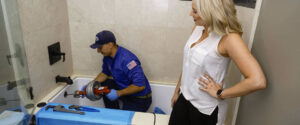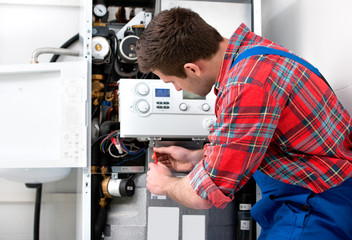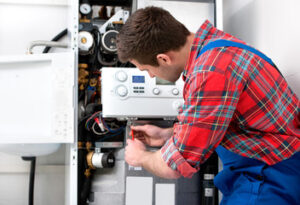Plumbing systems deliver water, take away waste, and regulate indoor climate in homes and buildings. Plumbers install and repair these systems. They also interpret building codes and regulations.
Many plumbers complete an apprenticeship program to learn their trade. These programs combine classroom instruction with on-the-job training under a journeyperson plumber.
A plumber works on homes and businesses’ water, drainage, and gas systems. These systems are used to supply water for cleaning and cooking and to dispose of waste. Plumbers are responsible for ensuring that these processes function optimally and safely. They may also install plumbing fixtures and appliances, such as bathtubs and toilets.
Some of a plumber’s most important job duties include inspecting pipes to determine their condition, developing a plan for the work to be completed, and completing the work as needed. Plumbers are also required to adhere to local and state regulations. For example, they must follow environmental and safety regulations regarding the disposal of materials.
Plumbers are often called to repair clogged drains and sewer lines. These are dangerous jobs because of the bacteria and other microbes that may be present in sewage. In addition, these tasks require the use of power tools and other specialized equipment. Plumbers must also have the ability to read and understand blueprints to determine the location of pipe connections and other necessary information.
When working on new construction projects, plumbers must be able to follow the plans exactly and ensure that all plumbing components are installed correctly. This requires high attention to detail and the ability to stay on schedule and within budget.
Plumbers are also responsible for maintaining their own tools and keeping them in good condition. They must be able to identify when a tool is worn or damaged and request replacement. They must also be able to communicate effectively with their coworkers and customers. In some cases, this can involve explaining complicated technical issues in a way that is easy to understand.
Education and Training Requirements
Today’s plumbers are more than just clog-fixers. They are skilled technicians that install, repair and maintain systems for potable water, sewage, drains and heating. Plumbers must complete a combination of formal training through a trade school or apprenticeship and on-the-job experience. Those who want to become a plumber must also meet local licensing requirements.
The qualifications for entering a plumbing apprentice program vary by state and region but generally include a high school diploma or GED certificate and a willingness to learn the trade. Many trade schools offer plumbing programs that combine classroom instruction with hands-on training from expert instructors. Classes may cover a range of subjects including Occupational Safety and Health Administration (OSHA) training, basic plumbing concepts, drafting and blueprint reading, mathematics, physics, water heaters, and more.
Workers must pass an exam after completing the education and training requirements to become a plumber. This exam evaluates the plumber’s knowledge of applications, diagnosing issues and troubleshooting solutions to plumbing problems. Upon passing the exam, a plumber becomes a journeyman plumber. Some states require a number of years of on-the-job experience and classroom education before taking the exam.
Plumbers must complete continuing education classes to keep up with evolving technologies and industry practices. This can be done through online courses offered by a variety of educational institutions or at a local trade school.
Those who wish to become plumbing professionals must be physically fit and willing to work in tight spaces for extended periods of time. The job often requires heavy lifting and long hours of standing and walking. Plumbers must also be able to follow written and verbal instructions. In addition, they may encounter hazardous materials such as human waste and fecal matter from sewer pipes which could contain infectious diseases including cholera, typhoid, hepatitis and polio.
License Requirements
A plumber needs to have a valid license to work in any municipality where they wish to practice. Each local jurisdiction sets its own licensing requirements. Many areas have specific exam questions based on the latest versions of state construction codes, and some have different licensing fees.
Those who wish to be licensed must register with the Department of Buildings in their city or town. Most plumbers get their initial licensing through an apprenticeship, sponsored by a trade union or private employer. The program lasts up to five years and includes classroom instruction as well as paid on-the-job training. Apprentices must pass a written and practical exam to be certified as a journeyman plumber.
Once a plumber has passed all of the relevant exams, they can apply for a master plumber license. There is a $200 fee for the written exam and a separate $250 fee for the practical exam.
The license must be renewed periodically, and there may be additional fees to pay for continuing education courses or other professional certifications. Plumbers must also carry insurance covering liability and workers’ compensation and submit proof of this insurance before they can be issued a license.
In some states, plumbers who specialize in a certain area, such as high-rise residential systems, can obtain specialty licenses. This allows them to be employed by a larger plumbing company or open their own business. Other specializations include medical gas and natural gas installations.
Work Environment
The work environment for plumbers can vary depending on the specific type of plumbing work they perform. Residential plumbers typically work in homes, performing installation and repair services for plumbing fixtures and appliances in kitchens, bathrooms, laundry rooms, and other living spaces. Commercial and industrial plumbers may work in larger facilities, such as hospitals, factories, or power plants, installing and maintaining large-scale plumbing systems that serve multiple occupants. In these settings, plumbers often collaborate with engineers and construction teams to integrate plumbing into new building projects seamlessly.
Because of the hands-on nature of the job, plumbers must be comfortable working in a variety of physical environments. They must be able to maneuver in tight spaces, lift heavy objects, and stand or kneel for extended periods of time. They also need to be able to work around dangerous materials, such as chemicals, sewage, and high-pressure systems. Many plumbers are self-employed, allowing them to set their own schedule and choose their projects. This can lead to higher earning potential, but also adds more responsibility to the role.



 Heating repair professionals are trained and experienced technicians who specialize in installing, maintaining, and repairing heating systems in residential and commercial buildings. They are
Heating repair professionals are trained and experienced technicians who specialize in installing, maintaining, and repairing heating systems in residential and commercial buildings. They are